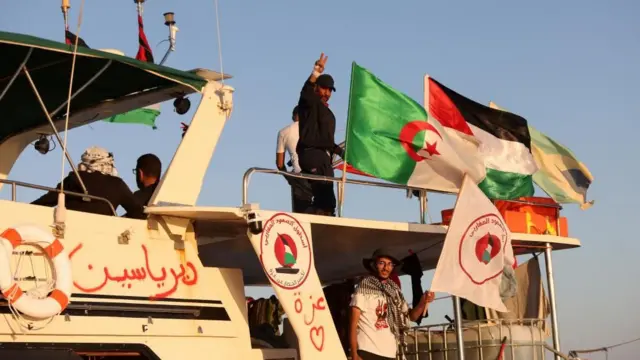
Israel Intercepts Gaza-Bound Aid Flotilla Amid Naval Blockade Dispute
A dramatic confrontation unfolded in the waters off Gaza when the Global Sumud Flotilla (GSF) was ordered by the Israeli navy to change course, and activists aboard several vessels say they were boarded by military personnel. The flotilla, carrying humanitarian aid and more than 500 individuals including high-profile figures, is challenging Israel’s long-standing naval blockade of Gaza.
According to organizers, multiple vessels—such as the Alma, Sirus, and Adara—have been intercepted and boarded. Communications were reportedly disrupted, with cameras going offline, complicating efforts to verify the condition of all aboard. The GSF claimed the flotilla remains about 70 nautical miles from Gaza, though other sources place it within 90 nautical miles.
From Israel’s perspective, the flotilla was warned it was “approaching an active combat zone” and declared to be in violation of a lawful naval blockade. The Israeli Foreign Ministry has not confirmed detailed boarding actions but maintains that vessels attempting to breach the blockade risk interception.
Past Incidents and Escalating Risks
This is not the first time that flotillas headed for Gaza have met forceful resistance. In past years, attempts such as the Madleen, Handala, and Conscience missions were intercepted at sea. In one recent incident in a Tunisian port, the GSF claimed a drone struck its main vessel, igniting a fire. The Tunisian authorities denied hostile action, attributing the fire to an accident. The flotilla organizers also report repeated drone attacks and communication jamming during their voyage near the Greek and Mediterranean routes.
Analysts call the current mission the largest of its kind in Gaza solidarity efforts—over 50 ships bearing delegations from at least 44 countries. This scale increases both the symbolic force of the effort and the stakes involved.
Diplomatic Pressure and Assurances
Several governments have expressed concern over the flotilla’s safety. Italy’s foreign minister claims he received assurances from Israel that no violence would be used against the 500 people aboard, which include politicians and climate activist Greta Thunberg. France, too, stated it urged that any boarding operation adhere to safe conditions. Meanwhile, Italy announced it would end its naval escort once the flotilla comes within 150 nautical miles of Gaza.
On the legal front, proponents argue Israel’s blockade and interdiction in international waters violate maritime and humanitarian law. Others defend Israel’s right to block passage into zones it deems militarily sensitive.
The Mission’s Standoff and Implications
As the flotilla advances toward what is termed a “high-risk zone,” the tension between humanitarian goals and security enforcement is sharply exposed. Organizers emphasize their mission is peaceful and call on Israel to allow safe passage and delivery of aid. Israel, for its part, labels the mission provocative and warns of naval intervention.
The interception of the flotilla could escalate into international incidents, especially if boarding turns violent or activists are detained. With diplomatic pressure mounting, both sides may find themselves under scrutiny from courts, international organizations, and human rights groups.
While uncertainty remains over exactly which vessels have been boarded and what their conditions are, the mission’s organizers vow to press on with their goal. The world watches closely as the Global Sumud Flotilla intercepted raises critical questions about maritime rights, humanitarian access, and the balance between security and relief in one of the most contested zones on earth.
Also, see:
BCCI to Launch Protest Against Mohsin Naqvi Over Asia Cup Trophy Controversy








